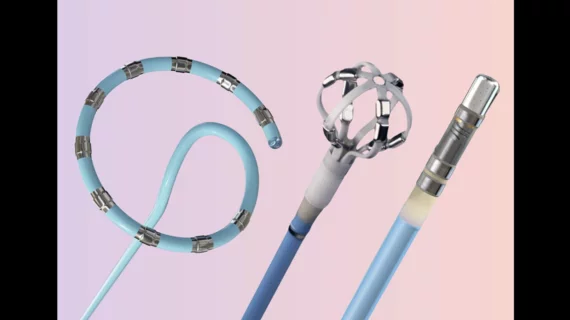Biosense Webster funding new PFA research
Biosense Webster, a part of Johnson & Johnson MedTech, is funding two new collaborative studies focused on the use of its Varipulse pulsed field ablation (PFA) system. While one study will focus on the system’s ability to treat a variety of atrial arrhythmias, including atrial fibrillation (AFib), the other is designed to examine the 12-year effectiveness of pulmonary vein isolation (PVI) and left atrial posterior wall (LAPW) ablation.
Clinicians will carry out both studies using the full Varipulse platform, which includes the Varipulse catheter, Trupulse generator and Carto 3 Mapping System software.
“Biosense Webster is pleased to collaborate on these studies to further understand the use of the Varipulse platform for diverse anatomies and arrhythmia types,” Jasmina Brooks, Biosense Webster’s president, said in a prepared statement. “We are committed to using multiple evidence generation approaches to lead the way in understanding PFA technology to inform future clinical practice.”
The VIRTUE study
VIRTUE, which officially began in September 2023, is a single-center, non-randomized clinical study designed to evaluate the Varipulse system’s ability to treat AFib, atypical atrial flutter and other common atrial arrhythmias.
Vivek Reddy, MD, director of electrophysiology for the Mount Sinai Health System and a professor of medicine in cardiac electrophysiology with the Icahn School of Medicine at Mount Sinai, is leading a research team that hopes to enroll a total of 150 patients.
“The VIRTUE study is designed to understand how this PFA platform can be used to treat a variety of patients,” Reddy said. “The Varipulse catheter and it’s integration with Carto holds promise to be a versatile tool for physicians treating many types of patients with atrial arrhythmias.”
The POLARIS study
POLARIS, which officially began enrolling patients in December 2023, will explore the safety and effectiveness of PVI and LAPW ablation in patients who present with paroxysmal AFib and persistent AFib. Electrophysiologist Moussa Mansour, MD, director of the Atrial Fibrillation Program at Massachusetts General Hospital and a professor of medicine with Harvard Medical School, will lead a team working to enroll 180 patients with paroxysmal AFib and another 180 patients with persistent AFib.
“Results of the study will add to the growing evidence that could point to PFA as the next generation technology for cardiac ablation,” Mansour said.
Pulsed field ablation keeps gaining momentum
PFA continues to gain momentum in the United States, with both Medtronic’s PulseSelect and Boston Scientific’s Farapulse gaining U.S. Food and Drug Administration (FDA) approval in recent months. Other vendors such as Abbott—and Biosense Webster, of course—are also working toward securing key regulatory approvals.
Because it uses electric fields to create pores in the cell walls as opposed to extreme temperatures, it limits the risk of harmful complications. For this reason PFA is widely expected to become the go-to treatment option over radiofrequency or cryoballoon ablation when AFib patients require ablation.

